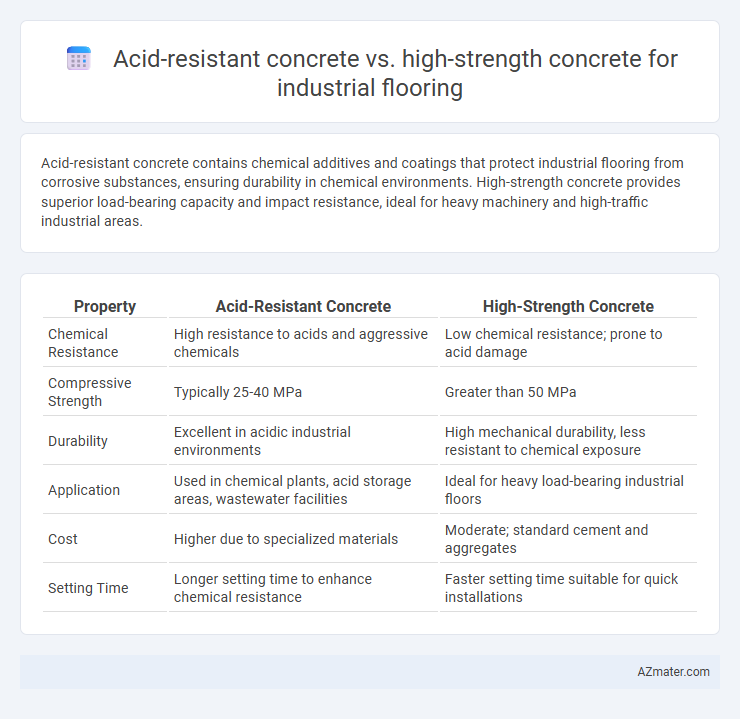Acid-resistant concrete contains chemical additives and coatings that protect industrial flooring from corrosive substances, ensuring durability in chemical environments. High-strength concrete provides superior load-bearing capacity and impact resistance, ideal for heavy machinery and high-traffic industrial areas.
Table of Comparison
| Property | Acid-Resistant Concrete | High-Strength Concrete |
|---|---|---|
| Chemical Resistance | High resistance to acids and aggressive chemicals | Low chemical resistance; prone to acid damage |
| Compressive Strength | Typically 25-40 MPa | Greater than 50 MPa |
| Durability | Excellent in acidic industrial environments | High mechanical durability, less resistant to chemical exposure |
| Application | Used in chemical plants, acid storage areas, wastewater facilities | Ideal for heavy load-bearing industrial floors |
| Cost | Higher due to specialized materials | Moderate; standard cement and aggregates |
| Setting Time | Longer setting time to enhance chemical resistance | Faster setting time suitable for quick installations |
Introduction to Industrial Flooring Requirements
Industrial flooring demands materials that withstand heavy loads, chemical exposure, and abrasion, making acid-resistant concrete ideal for environments with corrosive substances. High-strength concrete provides superior compressive strength to endure heavy machinery and dynamic loads common in industrial settings. Selecting between acid-resistant and high-strength concrete depends on specific operational conditions such as chemical exposure intensity and load-bearing requirements.
Overview of Acid-Resistant Concrete
Acid-resistant concrete is specifically formulated to withstand exposure to harsh chemicals, including acids commonly found in industrial environments, making it an ideal choice for flooring subjected to corrosive substances. Its composition includes special aggregates and binders that enhance chemical resistance while maintaining durability and structural integrity under heavy traffic. In contrast to high-strength concrete, which focuses on compressive strength, acid-resistant concrete prioritizes chemical resilience to protect industrial floors from degradation and extend service life.
Overview of High-Strength Concrete
High-strength concrete for industrial flooring offers compressive strengths typically above 6,000 psi, enabling superior load-bearing capacity and durability under heavy machinery and traffic conditions. Its dense microstructure reduces permeability, enhancing resistance to wear, abrasion, and chemical attack, which makes it ideal for demanding industrial environments. Compared to acid-resistant concrete, high-strength concrete prioritizes mechanical performance and structural integrity over specialized chemical resistance.
Chemical Resistance: Protection Against Corrosive Substances
Acid-resistant concrete offers superior protection against highly corrosive substances commonly found in industrial environments, maintaining structural integrity where chemical exposure is frequent. High-strength concrete emphasizes load-bearing capacity and durability but may degrade quickly when exposed to aggressive acids or chemicals. Selecting acid-resistant concrete enhances chemical resistance and extends flooring lifespan in facilities handling harsh chemicals, whereas high-strength concrete is better suited for areas prioritizing mechanical stress tolerance.
Load-Bearing Capacity and Structural Performance
Acid-resistant concrete offers superior chemical durability for industrial flooring in corrosive environments, maintaining structural integrity under frequent acid exposure, but typically features lower compressive strength compared to high-strength concrete. High-strength concrete provides exceptional load-bearing capacity suitable for heavy industrial equipment and dynamic loads, ensuring enhanced structural performance but may require additional protective measures against chemical degradation. Selecting between these concretes depends on balancing the need for chemical resistance versus maximum structural load requirements in industrial flooring applications.
Durability and Longevity in Harsh Industrial Environments
Acid-resistant concrete offers superior chemical resistance, preventing surface degradation and maintaining structural integrity in environments exposed to corrosive substances, which enhances durability in harsh industrial settings. High-strength concrete provides exceptional compressive strength, resisting heavy loads and mechanical wear, thus extending the lifespan of industrial flooring under intense operational stress. Combining acid resistance with high compressive strength optimizes flooring longevity by safeguarding against both chemical damage and physical abrasion.
Installation and Maintenance Considerations
Acid-resistant concrete for industrial flooring requires meticulous surface preparation and slow curing times to ensure chemical durability, often involving specialized primers and coatings during installation. High-strength concrete generally allows faster setting and simpler installation due to its enhanced compressive strength but may lack resistance to aggressive chemical environments, leading to more frequent maintenance in acidic applications. Maintenance of acid-resistant concrete focuses on regular inspections and immediate repair of surface damage to prevent chemical penetration, whereas high-strength concrete flooring maintenance emphasizes load-bearing performance and surface wear management.
Cost Comparison and Life Cycle Analysis
Acid-resistant concrete typically incurs higher initial costs compared to high-strength concrete due to specialized additives and formulations designed to withstand corrosive environments in industrial flooring. Life cycle analysis reveals acid-resistant concrete provides extended durability and reduced maintenance expenses in chemically aggressive settings, offsetting upfront investment over time. High-strength concrete offers cost-effective structural performance but may require more frequent repairs or replacements when exposed to acidic substances, increasing long-term expenditure.
Typical Applications and Industry Use Cases
Acid-resistant concrete is specifically formulated to withstand corrosive environments, making it ideal for industrial flooring in chemical plants, wastewater treatment facilities, and food processing industries where exposure to acidic substances is frequent. High-strength concrete, characterized by its superior compressive strength above 6000 psi, is commonly used in heavy industrial settings such as warehouses, manufacturing plants, and loading docks that demand high durability and load-bearing capacity. Selecting the appropriate concrete type depends on whether the primary requirement is chemical resistance or structural performance to ensure longevity and safety in industrial applications.
Choosing the Right Concrete Solution for Industrial Floors
Acid-resistant concrete is essential for industrial flooring exposed to corrosive chemicals and acids, providing long-term durability and protection against chemical degradation. High-strength concrete offers superior load-bearing capacity and abrasion resistance, making it ideal for heavy machinery and high-traffic areas. Selecting the right concrete depends on specific environmental conditions and operational demands, ensuring optimal performance and longevity in industrial settings.

Infographic: Acid-resistant concrete vs High-strength concrete for Industrial flooring
 azmater.com
azmater.com